Bllod and Gold Read online
Page 6
"Indeed as Lestat tells it, she may have even put the very idea of playing the instrument into his mind. I don't think so. I think she opened the doors and summoned him, but it was he who brought the violin.
"Calculating that it would make a sound totally unfamiliar and quite wonderful to her, he set out to mimic those he'd seen playing the instrument, because in fact he didn't know how to play it.
"Within moments, my beautiful Queen had risen from the throne and was moving towards him. And he in his terror had dropped the violin which she crushed with her foot. No matter. She took him in her arms. She offered her blood to him, and then there happened
something so remarkable that it's painful for me to reveal it. Not only did she allow him to drink from her, she also drank from him. "It seems a simple thing, but it is not. For in all my centuries of coming to her, of taking blood from her, I had never felt the press of her teeth against me.
"Indeed, I know of no supplicant whose blood she ever drank. Once there was a sacrifice, and yes, she drank from that victim, and that
victim was destroyed. But from her supplicants? Never. She was the fount, the giver, the healer of blood gods, and burnt children, but she did not drink from them.
"Yet she drank from Lestat.
"What did she see in those moments? I cannot imagine, yet it must have been a glimpse into the years of that time. It must have been a glimpse into Lestat's soul. Whatever it was, it was momentary, for her consort Enkil soon rose and moved to stop it, and by this time, I had arrived, and was trying desperately and successfully to prevent Lestat from being destroyed by Enkil who seemed to have no other purpose.
"The King and Queen returned to their throne, besmirched and bloody and finally silent. But for the rest of the night Enkil was restless,
destroying the vases and braziers of the shrine.
"It was a terrifying display of power. And I realized that for his safety, indeed, even for my own, I must say farewell at once to Lestat, which caused me excruciating pain, and so we parted the following night."
Marius fell silent again, and Thorne waited patiently. Then Marius began to speak once more.
"I don't know what caused me the worst pain—the loss of Lestat, or my jealousy that she had given and taken with him. I'm unable to know my own mind. You understand I felt I possessed her. I felt she was my Queen." His voice dropped to a whisper. "When I revealed her to him, I was displaying a possession! You see what a liar I was?" he asked. "And then to lose him, to lose this young one with whom I felt such utter communion. Ah, that was such rich pain. Rather like the music of the violin, I think, just as deeply colored, such terrible pain."
"What can I do to ease your sorrow now?" asked Thorne. "For you carry it, as if she were here still."
Marius looked up, and suddenly an expression of pure surprise brightened his face. "You're right," he said. "I carry the obligation, as if she were still with me, as if even now I had to go and spend my hours in her shrine."
"Can't you be glad that it's over?" asked Thorne. "It seemed when I lay in my cave of ice, when I saw these things in dreams that there were others who were at peace when it was finished. Even the red-haired twins whom I saw standing before everyone seemed to have a sense that it was done."
Marius nodded. "They do all share this," said Marius, "except perhaps
for Lestat." He looked wondering at Thorne.
"Tell me now how she was wakened finally," said Thorne, "how she became the slayer of her children. I felt her pass me, close and with a searching eye, yet somehow I was not found."
"Others as well escaped her," said Marius, "though how many no one knows. She tired of her slaughter and she came to us. I think she thought that she had time to finish. But her end came swiftly enough.
"As for the second resurrection, it was Lestat again, but I am as much to blame myself.
"This is what I believe happened. I brought the inventions of the modern world to her as offerings. At first it was the machines that played music, and then came those which would show moving pictures.
At last, I brought the most powerful of all, the television that would play constantly. I set it in her shrine as though it were a sacrifice."
"And she fed upon this thing," said Thorne, "as gods are wont to do when they come down to their altars."
"Yes, she fed upon it. She fed upon its terrible electric violence. Lurid colors flashed over her face, and images accosted her. It might have wakened her with the sheer clamor. And I wonder sometimes if the endless public talk of the great world could not have in itself inspired an imitation of a mind in her."
"An imitation of a mind?"
"She awoke with a simple ugly sense of purpose. She would rule this world."
Marius shook his head. His attitude was one of profound sadness.
"She would outwit its finest human minds," he said sorrowfully. "She would destroy the vast majority of this world's male children. In a female paradise, she could create and enforce peace. It was nonsense— a concept drenched in violence and blood.
And those of us who tried to reason with her had to take great care with our words not to insult her. Where could she have gotten these notions, except from the bits and pieces of electric dreams that she watched on the giant screen I'd provided for her? Fictions of all kinds, and what the world calls News, all this had inundated her. I had loosed the flood."
Marius's gaze flashed on Thorne as he continued: "Of course she saw the vivid video songs of The Vampire Lestat." Marius smiled again, but it was a sad smile, and it brightened his face as sad songs brighten a face. "And Lestat presented in his video films the very image of her on her throne as he had seen her centuries ago. Breaking faith with me, he told the secrets I had confided to him."
"Why didn't you destroy him for this!" said Thorne, before he could stop himself. "I would have done so."
Marius only shook his head.
"I think I've chosen to destroy myself instead," he said. "I've chosen
to let my heart break inside me."
"Why, explain this thing to me."
"I can't, I can't explain it to myself," said Marius. "Perhaps I understand
Lestat only too well. He couldn't endure the vow of silence he'd given me. Not in this world you see around you with all its wonders. He felt driven to reveal our history." The heat danced in Marius's face. His fingers gripped the arms of his chair with only a little restlessness. "He tore loose from all bonds that connected us," he said, "friend and friend, teacher and student, old and young, watcher and searching one."
"Outrage," said Thorne, "what else could you feel but fury?"
"Yes, in my heart I did. But you see, I lied to them, the other blood drinkers, our brothers, our sisters. Because once the Queen had risen, they needed me...."
"Yes," said Thorne, "I saw it."
"They needed the wise one to reason with her, and deflect her from her course. There was no time for quarreling. Lestat's songs had brought her forth a monster. I told the others there was no wound. I took Lestat in my arms. And as for my Queen, ah, my Queen, how I denied that I had ever loved her. And all this for the company of a small band of immortals. And I tell the truth to you."
"Does it feel good to you to say it?"
"Oh, yes, it feels good," Marius answered.
"How was she destroyed? "
"Thousands of years ago a curse had been put on her by one whom she had treated with cruelty and that one came to settle the score. A single blow decapitated our beautiful Queen, and then from her body the Sacred Core of the blood drinkers was promptly taken into the avenger, either from brain or heart, I know not which, for during those fatal moments I was as blind as all the others.
"I know only the one who slew the Queen now carries the Sacred Core within her and where she's gone or how I can't tell you."
"I saw the red-haired twins," said Thorne. "They stood beside her body. 'The Queen of the Damned,' said my Maharet. I heard those words. I saw Maharet with her arm
around her sister."
Marius said nothing.
Again Thorne felt himself become agitated. He felt the beginnings of pain inside. In memory, he saw his Maker coming towards him in the snow. What fear did he have then, a mortal warrior facing a lone witch whom he could destroy with sword or ax? How frail and beautiful
she had seemed, a tall being in a dress of dark-purple wool, her arms out as if welcoming him.
But I have come here for you. It is for you that I linger.
He wouldn't fall under her spell. They wouldn't find his body in the snow, the eyes torn out of his face, as they had found so many others.
He wanted the memory to go away. He spoke.
"She is my Maker, the red-haired one," he said, "Maharet, the sister of the one who took within herself the Sacred Core."
He paused. He could scarcely breathe he felt such pain.
Marius stared at him intently.
"She had come North to find a lover among our people," Thorne said. He paused, his conviction wavering. But then he continued. "She hunted our clan and the others who lived in our valley. She stole the eyes from those whom she slew."
"The eyes and the blood," said Marius to him softly. "And when she made you a blood drinker, you learnt why she needed the eyes."
"Yes, but not the true story—not the tale of the one who had taken her mortal eyes. And of her twin, I knew not an inkling. I loved her completely. I asked few questions. I could not share her company with others. It made me mad."
"It was the Evil Queen who took her eyes," said Marius, "when she was still human; and from her twin sister, the tongue. That was a cruel injustice, that. And one who also possessed the Blood could not endure it, and so he made them both blood drinkers before the Evil Queen divided them and sent each twin to a different side of the world."
Thorne gasped as he though of it. He tried to feel love inside himself
He saw his Maker again in the brightly lighted cave with her thread and her spindle. He saw her long red hair.
"And so it was finished," said Thorne, "the catastrophe I beheld as I
slept in the ice. The Evil Queen is gone, punished forever, and the twins took the Sacred Core, yes, but when I search the world for the
visions or the voices of our kind I can't find the twins. I hear nothing of
them, though I want to know where they are."
"They have retreated," said Marius. "They know they must hide, They know that someone may try to take the Sacred Core from them.
They know that someone, bitter and finished with this world, may seek to destroy us all."
"Ah, yes," said Thorne. He felt a chill come over his limbs. He wished suddenly that he had more blood in his veins. That he could go out and hunt—but then he didn't want to leave this warm place and these flowing words, not just now. It was too soon.
He felt guilty that he had not told the whole truth of his suffering and his purpose to Marius. He didn't know if he could, and it seemed a terrible thing now to be under this roof, yet he remained there.
"I know your truth," said Marius gently. "You've come forth with one vow and that is to find Maharet and do harm to her."
Thorne winced as though he'd been struck hard in the chest. He made no answer.
"Such a thing," said Marius, "is impossible. You knew it when you left her centuries ago for your sleep in the ice. She is powerful beyond our imagining. And I can tell you, without doubt, that her sister never leaves her."
Thorne could find no words. At last he spoke in a tense whisper.
"Why do I hate her for the form of life she gave me, when I never hated my mortal mother and father?"
Marius nodded and gave a bitter smile.
"It's a wise question," Marius said. "Abandon your hope of harming her. Stop dreaming of those chains in which she once bound Lestat unless you truly wish for her to bind you in them."
It was Thorne's turn to nod.
"But what were those chains?" he asked, his voice tense and bitter as before, "and why do I want to be her hateful prisoner? So that she can know my wrath every night as she keeps me close to her?"
"Chains made of her red hair?" Marius suggested, with a slight shrug of his shoulders, "bound with steel and with her blood?" he mused. "Bound with steel and with her blood and gold, perhaps. I never saw them. I only knew of them, and that they kept Lestat
helpless in all his anger."
"I want to know what they were," said Thorne. "I want to find her."
"Forswear that purpose, Thorne," said Marius. "I can't take you to her. And what if she beckoned for you as she did so long ago, and then she destroyed you when she discovered your hatred?"
"She knew of it when I left her," said Thorne.
"And why did you go?" Marius asked. "Was it the simple jealousy of others which your thoughts reveal to me?"
"She took them in favor one at a time. I couldn't endure it. You speak of a Druid priest who became a blood drinker. I know of such a one Mael was his name, the very name you've spoken. She brought him into her small circle, a welcome lover. He was old in the Blood and had tales to tell, and she longed for this more than anything. I turned away from her then. I scarce think she saw me retreat. I scarce think she felt my hatred."
Marius was listening intently. Then he spoke.
"Mael" he said, his words gentle and patient. "Tall and gaunt always, with a high bridged nose and deep-set blue eyes and long blond hair from his servitude in the Sacred Grove. That's the Mael who lured your sweet Maharet from you?"
"Yes," said Thorne. He felt the pain in his chest slacken. "And she was sweet, that I can't deny, and she never spurned me. It was I who wandered away, towards the North land. It was I who hated him for his flattery of her and his clever stories."
"Don't seek a quarrel with her," Marius said. "Stay here with me, and by and by, she may come to know that you're here, and she may send you her welcome. Be wise then, I beg you."
Thorne nodded again. It was as if the terrible battle was over. He had confessed his wrath and it was gone, and he sat still and simple near the fire, the warrior no longer. Such was the magic of words, he thought.
Then memory came again. Six centuries ago. He was in the cave, and could see the flicker of the firelight. He was bound and couldn't move. She lay beside him, peering down into his eyes and whispering to him. He couldn't remember those words, because they were part of something larger and more terrible, something as strong as the threads that bound him.
He could break those threads now. He could cut loose of the memories and lodge himself firmly in this room. He could look at Marius.
He gave a long slow sigh.
"But return to your tale, if you will," he asked. "Why after the Queen
was destroyed, and after the twins were gone, why then didn't you reveal
your rage to the blood drinker Lestat, why didn't you take your
vengeance? You'd been betrayed! And disaster had followed upon it."
"Because I wanted to love him still," said Marius, as though he had
long known the answer, "and I wanted to be loved, and I could not
forfeit my place as the wise and patient one, as I've said. Anger is too painful for me. Anger is too pathetic. I cannot bear it. I cannot act upon it."
"Wait for one moment," said Thorne. "Say this again?"
"Anger is too pathetic," Marius repeated. "It's too much at a
disadvantage always. I can't act upon it. I can't make it mine."
Thorne gestured for quiet. He sat back considering, and it seemed a cold air settled on him in spite of the fire.
"Anger is weak," Thorne whispered. It was a new idea to him. In his mind anger and rage had always been akin. And rage had seemed something akin to Wodin's fury. One summoned rage before going into battle. One welcomed rage into one's heart. And in the ice cave, he had let an old rage awaken him.
"Anger is as weak as fear," said Marius. "Can either of us endure fear?"
"No," said Tho
rne. "But you're speaking of something inside you that's heated and strong."
"Yes, there is something brutal and hurt inside of me, and I wander alone, refusing the cup of anger, choosing silence rather than angry words. And I come upon you in the North land, and you're a stranger to me, and I can bare my soul to you."
"Yes, that you can do," said Thorne. "For the hospitality you have given me, you can tell me anything. I will never break your trust, that I promise. No common words or songs will ever come from me.Nothing can make such a thing happen." He felt his voice grow strong as he spoke. It was because he was honest in what he said. "What has become of Lestat? Why is he silent now? I hear no more songs or sagas from him."

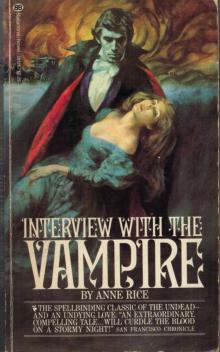 Interview with the Vampire
Interview with the Vampire Christ the Lord: Out of Egypt
Christ the Lord: Out of Egypt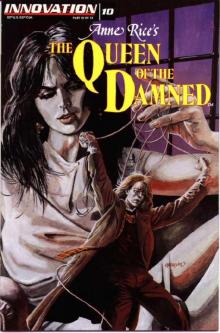 The Queen Of The Damned
The Queen Of The Damned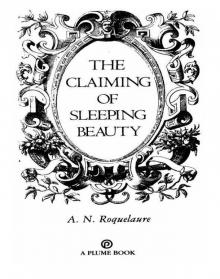 The Claiming of Sleeping Beauty
The Claiming of Sleeping Beauty Prince Lestat
Prince Lestat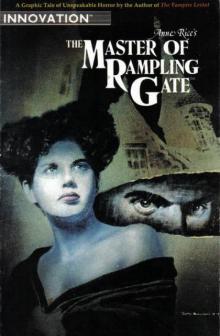 The Master of Rampling Gate
The Master of Rampling Gate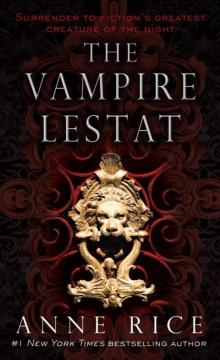 The Vampire Lestat
The Vampire Lestat Blood Canticle
Blood Canticle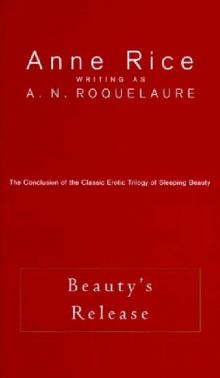 Beauty's Release
Beauty's Release Pandora
Pandora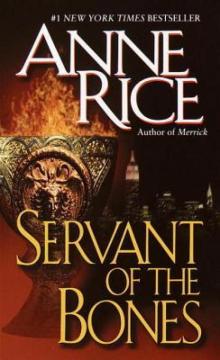 Servant of the Bones
Servant of the Bones Of Love and Evil
Of Love and Evil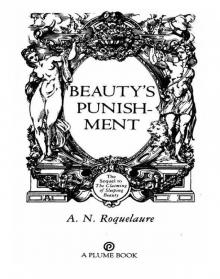 Beauty's Punishment
Beauty's Punishment Cry to Heaven
Cry to Heaven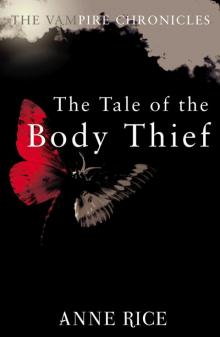 The Tale of the Body Thief
The Tale of the Body Thief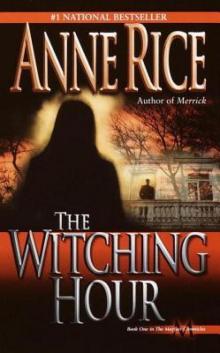 The Witching Hour
The Witching Hour Memnoch the Devil
Memnoch the Devil Blackwood Farm
Blackwood Farm Beauty's Kingdom
Beauty's Kingdom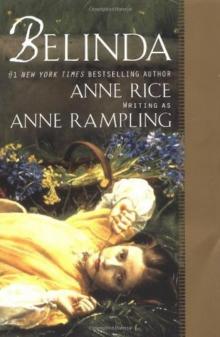 Belinda
Belinda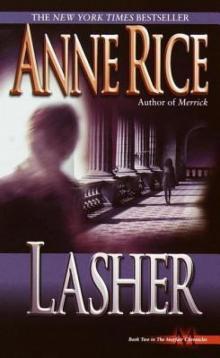 Lasher
Lasher Vittorio, the Vampire
Vittorio, the Vampire Angel Time
Angel Time Called Out of Darkness: A Spiritual Confession
Called Out of Darkness: A Spiritual Confession Blood And Gold
Blood And Gold The Passion of Cleopatra
The Passion of Cleopatra Taltos
Taltos Exit to Eden
Exit to Eden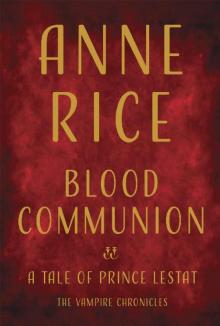 Blood Communion (The Vampire Chronicles #13)
Blood Communion (The Vampire Chronicles #13) The Wolf Gift
The Wolf Gift The Wolves of Midwinter
The Wolves of Midwinter Prince Lestat and the Realms of Atlantis
Prince Lestat and the Realms of Atlantis The Ultimate Undead
The Ultimate Undead The Vampire Lestat tvc-2
The Vampire Lestat tvc-2 The Road to Cana
The Road to Cana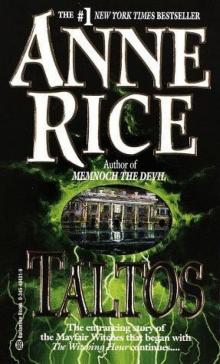 Taltos lotmw-3
Taltos lotmw-3 Merrick tvc-7
Merrick tvc-7 Called Out of Darkness
Called Out of Darkness Pandora - New Vampires 01
Pandora - New Vampires 01 Bllod and Gold
Bllod and Gold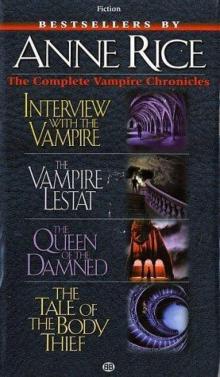 The Queen Of the Damned: Vampire Chronicles
The Queen Of the Damned: Vampire Chronicles The Sleeping Beauty Trilogy
The Sleeping Beauty Trilogy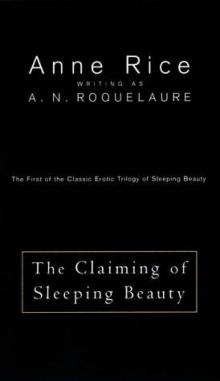 The Claiming of Sleeping Beauty b-1
The Claiming of Sleeping Beauty b-1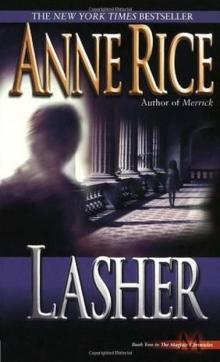 Lasher lotmw-2
Lasher lotmw-2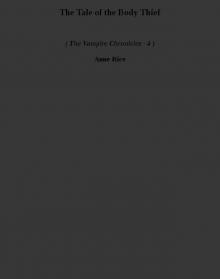 The Tale of the Body Thief tvc-4
The Tale of the Body Thief tvc-4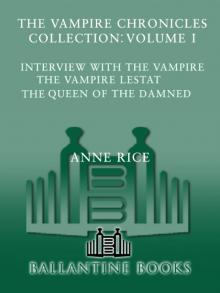 The Vampire Chronicles Collection
The Vampire Chronicles Collection Ramses the Damned
Ramses the Damned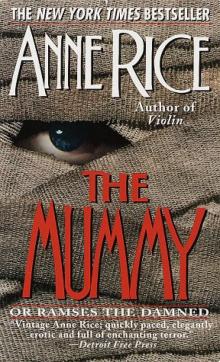 The Mummy - or Ramses the Damned
The Mummy - or Ramses the Damned Vittorio, The Vampire - New Vampires 02
Vittorio, The Vampire - New Vampires 02 The Vampire Armand tvc-6
The Vampire Armand tvc-6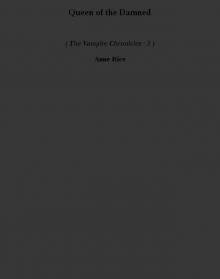 Queen of the Damned tvc-3
Queen of the Damned tvc-3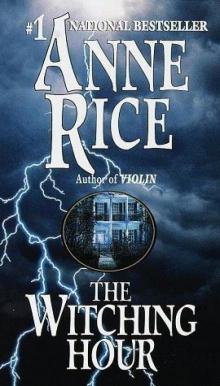 The witching hour lotmw-1
The witching hour lotmw-1 Feast of All Saints
Feast of All Saints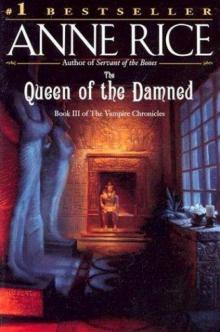 Queen of the Damned
Queen of the Damned The Wolves of Midwinter twgc-2
The Wolves of Midwinter twgc-2 The Mummy
The Mummy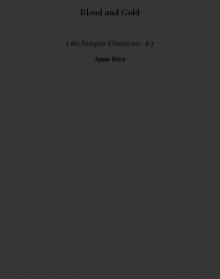 Blood and Gold tvc-8
Blood and Gold tvc-8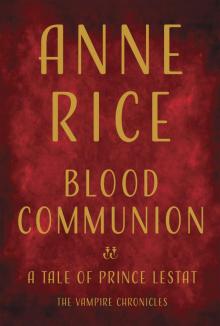 Blood Communion
Blood Communion Interview with the Vampire tvc-1
Interview with the Vampire tvc-1 Prince Lestat: The Vampire Chronicles
Prince Lestat: The Vampire Chronicles